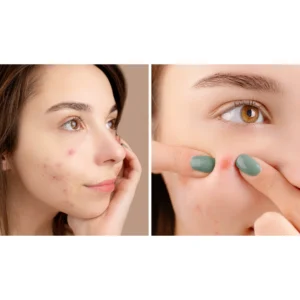Why does acne occur, and does sweat cause acne?
Does sweat cause acne? We often see a condition commonly referred to as the “disease of adolescence.” However, scientifically, acne can occur at any age—it can appear during aging and even in newborns.
Does sweat cause acne?
Main causes of acne is sweat. If a person sweats excessively and has oily skin, the chances of developing acne increase. Two main factors contribute to acne, especially during adolescence:
- Oily skin
- Increased androgen hormone
This hormone increases the function of the sebaceous glands in the face, leading to excess sebum secretion and acne. Dermatologists usually do not treat mild acne (such as 2-4 or 4-5 pimples) in teenagers. Instead, they recommend drinking water, eating fruits, and maintaining cleanliness. In most cases, acne improves on its own. However, many parents worry and compare their children to others, which is unnecessary.
Does acne cause it in newborns?
Acne in newborns is called infantile acne. The main cause is high levels of endogenous hormones. When we say acne is more common during adolescence or puberty, this hormone is also the reason. But when does it occur in children?
When a child is born, the mother’s endogenous hormones remain in the body. Sometimes, these hormones disappear within two months, but in some cases, they can last up to six months. Acne may appear during this period. However, it usually does not require any treatment. Once hormone levels return to normal, the acne heals on its own. If it becomes excessive, treatment may be provided.
Treatment
If treatment is required, doctors usually prescribe topical (applied) medications. Sometimes anti-fungal treatments are given. In some cases, vitamin A is prescribed, as it acts as a peeling agent.
However, if the acne is pustular, it can appear as blackheads, whiteheads, or yellowheads. Some refer to this as comedonal acne. Nowadays, many people seek information online, but they do not always get accurate details. Therefore, it is essential for doctors to diagnose the condition correctly.
If acne is caused by Propionibacterium acnes (P. acnes), antibiotics such as Tetracycline, Minocycline, and Doxycycline may be prescribed. These medications are particularly effective for oily skin.
Special Treatment
vitamin A derivative called Roaccutane (Isotretinoin) is used for severe cases. It:
- Reduces the function of the sebaceous glands
- Decreases sebum production
As a result, the skin becomes less oily, and acne heals faster. However, there are some precautions when using it:
- Pregnant women should not use it.
- Pregnancy should be avoided for at least six months after stopping the medication.
- It is not recommended for use during menstruation.
- It is safe for boys but should only be taken under a doctor’s supervision.
Acne can be effectively controlled and reduced quickly with this type of treatment.
